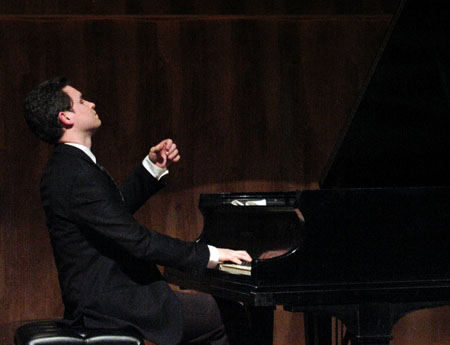
At age 22, pianist Matthew Graybil has spent approximately two-thirds of his life as a performer, having begun studies at age 6, and making his orchestral debut at 14.
Last Saturday evening, the young yet seasoned artist gave what must be called a compelling solo concert at the Levitas Center for the Arts at the Southampton Cultural Center as part of the ongoing “Rising Stars” recital series.
The program combined the formal grace of Domenico Scarlatti with the romanticism of Beethoven and the pianistic fireworks of Franz Liszt. Despite gloomy weather, a sizeable audience, enlivened by a group of Ross School music students, demonstrated its appreciation of Mr. Graybil’s fine performance with plentiful applause.
Mr. Graybil began with three sonatas by Scarlatti—K.87 in B minor; K.9 in D minor, and K.141 in D minor. Scarlatti, born in 1685, wrote a total of 600 sonatas. But though they are similar in form and length, each has a distinct beauty of its own—like matched baroque pearls in a necklace.
Mr. Graybil performed the works with crisp and clear styling. With attention to detail of phrasing, he moved gracefully from the contemplative mood of the first selection to the lively melodies of the third.
Ludwig van Beethoven’s Sonata No.26, Opus 81a, known as “Les Adieux,” followed. This three-movement work begins with a somewhat melancholy “Farewell,” marked Adagio-Allegro, continues with “Absence,” marked Andante espressivo, and ends with a most vivacious (Vivacissimamente) “Return.” It was dedicated to the Archduke Rudolph who was forced to flee Napoleon’s armies.
Mr. Graybil gave the work a serious, sensitive reading, bringing out its many lovely melodic themes with great expressiveness. His technical control of dynamics and tone color in fast passages was impressive.
Moving on to Franz Liszt’s transcription of Robert Schumann’s song “Widmung,” Mr. Graybil treated his audience to a fine, lyrical performance of this intensely romantic gem. “Widmung,” which means Dedication, is a love song, heart-wrenching as only the German Romantic poets could make it. “You are my love … you are my heart …”
When Mr. Graybil finished, it took a moment for the audience to emerge from its reverie and applaud.
The concluding piece was another transcription by Liszt—“Reminiscences de Norma,” based on the opera by Vincenzo Bellini. It is in essence a mini-opera, highlighting the major roles and arias, embellishing, dramatizing, and connecting them in a complex and technically demanding showpiece. It reminds the listener that Liszt, who was a demon pianist himself, was intent on using the entire range of the piano—in fact he probably wanted the pianist to strike all 88 keys at once.
If Mr. Graybil’s demeanor so far had been a bit reserved, “Norma”—or perhaps the ghost of Liszt—now worked a transformation. The pianist launched into the fervent melodies, crashing chords, and palpitating runs with courage, but also with the skill to remain in control, although his fingers appeared as a blur. Opera buffs must love this piece; others may think the word “bombastic” applies in certain moments.
Mr. Graybil’s performance was excellent throughout, and garnered enthusiastic applause and calls for an encore. He obliged with a calm Etude (Op.2, No.1) by Alexander Scriabin. A second encore was desired, so Mr. Graybil went back to Liszt, playing the Hungarian Rhapsody No. 15 as transcribed by the legendary Vladimir Horowitz. This piece is anything but calm; still, Mr. Graybil smiled sweetly, as if to say: “You thought I was tired?”
Saturday’s concert was sponsored by Dr. and Mrs. Michael J. Errico of Southampton. The Rising Stars piano recital Series will resume in April, with concerts by Zsolt Bognar, Tanya Gabrielian, and Gleb Ivanov.